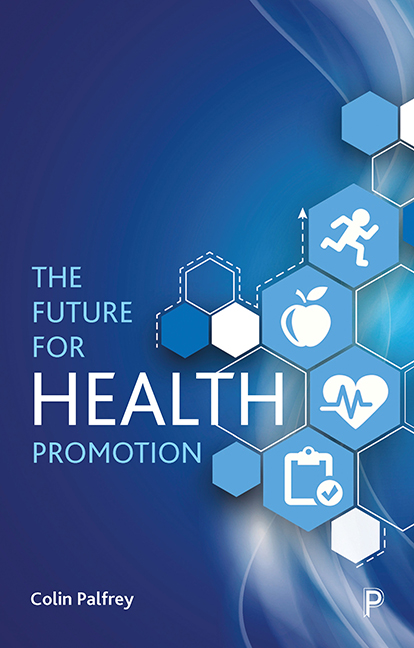Book contents
- Frontmatter
- Contents
- List of abbreviations
- Acknowledgements
- one Main themes
- two The origins of health promotion
- three Evidence base and methods for evaluation
- four Strategies for health promotion
- five Health economics and health promotion
- six Health promotion and mental health
- seven International perspectives
- eight The future for health promotion
- References
- Index
four - Strategies for health promotion
Published online by Cambridge University Press: 12 April 2022
- Frontmatter
- Contents
- List of abbreviations
- Acknowledgements
- one Main themes
- two The origins of health promotion
- three Evidence base and methods for evaluation
- four Strategies for health promotion
- five Health economics and health promotion
- six Health promotion and mental health
- seven International perspectives
- eight The future for health promotion
- References
- Index
Summary
Alternative interpretations of the route to better health
The following two opposing routes to better health could be described as the two health promotion doctrines. Approach A is a health education approach that seeks to influence individual lifestyle, while Approach B proposes social change and political action as the only way to reduce health inequalities and improve public health.
Approach A
• Don't smoke. If you can, stop. If you can’t, cut down.
• Follow a balanced diet, with plenty of fruit and vegetables.
• Keep physically active.
• Manage stress by, for example, talking things through and making time to relax.
• If you drink alcohol, do so in moderation.
• Cover up in the sun and protect children from sunburn.
• Practise safer sex.
• Take up cancer-screening opportunities.
• Be safe on the roads: follow the Highway Code.
• Learn the First Aid ABC – airways, breathing, circulation.
Approach B
• Don't be poor. If you can, stop. If you can’t, try not to be poor too long.
• Don't have poor parents.
• Own a car.
• Don't work in a stressful, low-paid, manual job.
• Don't live in damp, low-quality housing.
• Be able to go on a foreign holiday and sunbathe.
• Practise not losing your job and don't become unemployed.
• Take up all the benefits you are entitled to if you are unemployed, retired, sick or disabled.
• Don't live next to a busy major road or near a polluting factory.
• Learn how to fill in the complicated housing benefit/asylum application forms before you become homeless and destitute. (Raphael, 2002)
While epidemics of contagious diseases have disappeared from the UK, other health concerns have prompted all parts of the UK to declare policies to confront four quasi-epidemics: obesity, lack of exercise, poor diet and dementia. Just as in previous centuries, when faced with an epidemic, government health policies have focused on trying to establish the cause of what might be termed serious health variations. In the UK, all four governmental bodies have pinpointed socioeconomic factors as the most likely reasons why certain sections of the population are experiencing relatively poor health.
Causes of ill health
The question of whether poverty, however defined, is a cause of ill health has been discussed in previous chapters. What follows is a more detailed investigation into whether this is merely a supposition or whether it stems from undeniable research-based evidence.
- Type
- Chapter
- Information
- The Future for Health Promotion , pp. 83 - 112Publisher: Bristol University PressPrint publication year: 2018



